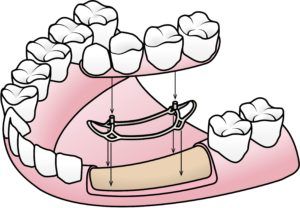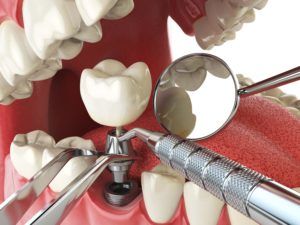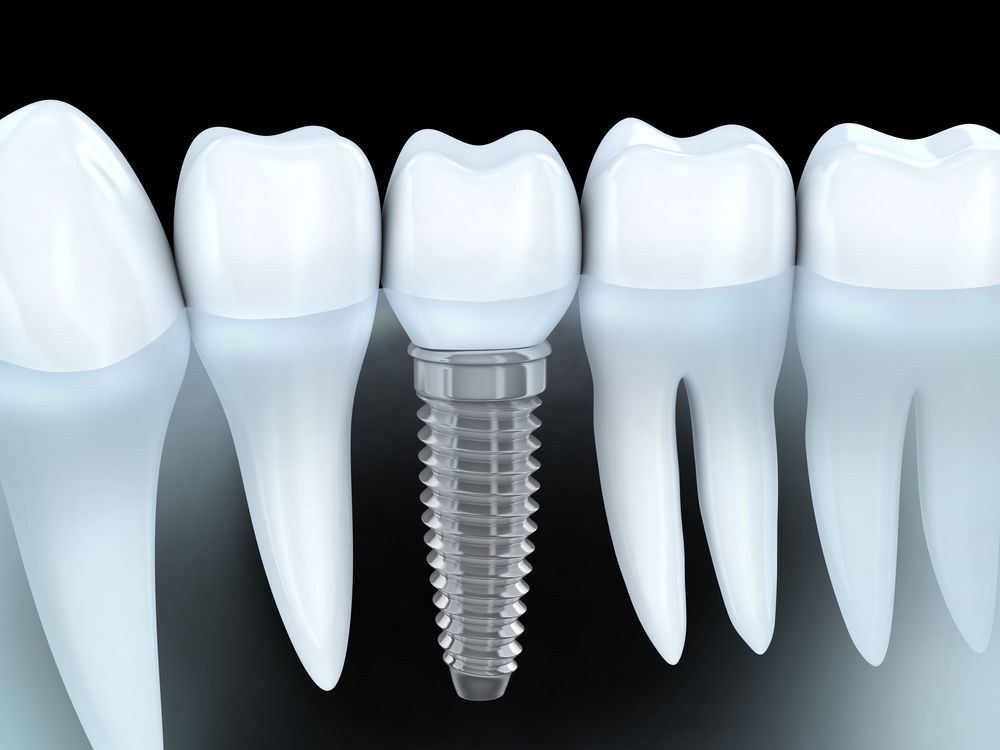Dental implants are one of the strongest and longest lasting restoration methods. This method uses an artificial tooth root placed in the jawbone to stimulate the jawbone and stabilize a dental prosthesis such as a dental crown or denture. Dental implants simultaneously keep the jawbone from deteriorating as a result of missing teeth while also restoring the function and aesthetics of the missing tooth. Because of their many benefits, dental implants are highly recommended as the optimal choice for decayed, damaged, or missing teeth.
Did You Know?
Dental implants are made up of three main structures: the implant, abutment, and dental prosthetic. The implant consists of a titanium screw that lies in the jawbone below the gum line. The abutment is the connector piece that holds the dental prosthesis to the implant. Finally, the dental prosthesis is the visible portion, which usually consists of a dental crown or denture.
Frequently Asked Questions:
Should I consider dental implants?
You may want to consider dental implants if your teeth are badly damaged, decayed, or are missing altogether. Dental implants are especially beneficial for missing teeth as they help stimulate the jawbone and prevent bone resorption. To find out if dental implants are the ideal choice for you, schedule a consultation with Ace Dental today!
Are there different types of dental implants and which is best?

There are two main types of dental implants: endosteal and subperiosteal. Endosteal implants are the most commonly used type of dental implants and are used almost exclusively for dental implant procedures. Endosteal implants are designed for placement directly into the jawbone. The other type of dental implant, subperiosteal, is far less common and is placed on top of the jawbone just under the gumline instead of within the jawbone.
Most dentists will recommend endosteal implants because they are generally stronger and have higher success rates. However, subperiosteal implants may be a better option for you if you are lacking proper bone mass to support an endosteal implant and cannot or do not wish to undergo a bone graft. Ultimately, Dr. Pushpa Sachdeva will help you determine which option is best.
What is a bone graft and do I need one?
Bone grafts are commonly associated with dental implants because they are used to build up bone mass in individuals who initially lack the necessary bone mass to support a dental implant. A bone graft harvests bone from an area of your body, generally the ribs, hips, pelvis, or wrist, and then places it in an area of little bone mass. Within a few months, new bone essentially grows and increases the bone mass, creating an ideal foundation for the dental implant.
You may need a bone graft if you do not have ample bone mass to support a dental implant. If your teeth have been missing for longer than six months, then you have a higher chance of needing a bone graft. Dr. Pushpa Sachdeva will evaluate your bone structure and help you determine if a bone graft is necessary.
What happens during the dental implant procedure?
During the dental implant procedure, you will be sedation for your comfort. Dr. Pushpa Sachdeva will make a tiny incision in your gums and use specialized dental tools to prepare and shape the socket for your implant. Once the socket has been prepared, the implant will be placed into the jaw bone. At this time, the abutment may or may not be screwed into the implant. Generally, the abutment will be screwed into the implant so that the gums can be sutured up over the implant with the abutment protruding above the gum line. Depending on the location of the tooth, a provisional restoration may be placed on the abutment.

After the implants are placed, they will need to heal for about 3-6 months. During this time, a process known as osseointegration will occur. Osseointegration is the process of the bones fusing to the implants in order to hold them in place. It is an essential part of the dental implant procedure and is what gives dental implants their strength. After the bones have properly fused around the implant, then the permanent restoration can be attached to the abutment and the dental implant procedure is complete.
What happens after the dental implant procedure?
After your dental implant procedure, you will experience swelling, pain, and some bleeding. You may be prescribed pain medication or antibiotics to alleviate some of these symptoms. In the first few days following surgery, you will want to keep your head elevated, relax, and avoid physical activities.
You will also need to temporarily change your diet while recovering. In the days directly following surgery, it is recommended to eat cool, soft foods. Try to avoid warm foods for at least 2-3 days after surgery because they can cause bleeding. In the first few weeks following surgery, you will be on a strict soft-foods diet. Some suggestions are pasta, eggs, fish, beans, rice, steamed veggies, and applesauce. As you heal, you can gradually start to eat harder foods. However, you will want to discuss this with Dr. Pushpa Sachdeva to avoid damaging your implants.
How long will my dental implants last?
Your dental implants have the ability to last for about 20-30 years. However, the average lifespan of dental implants is usually around 10 years. This number can vary depending on how well you take care of your dental implants and your individual dental habits. To keep your implants lasting, be sure to brush twice daily, floss once daily, and visit Ace Dental at least twice a year for your routine dental checkup. Regular visits with Dr. Pushpa Sachdeva helps to identify possible problems with your implants before they have a chance to get worse.
Dr. Pushpa Sachdeva has been providing some of the best dental care in Nairobi for over 33 years. For comprehensive, family-friendly dental care for all ages, schedule a consultation at Ace Dental Care today!




